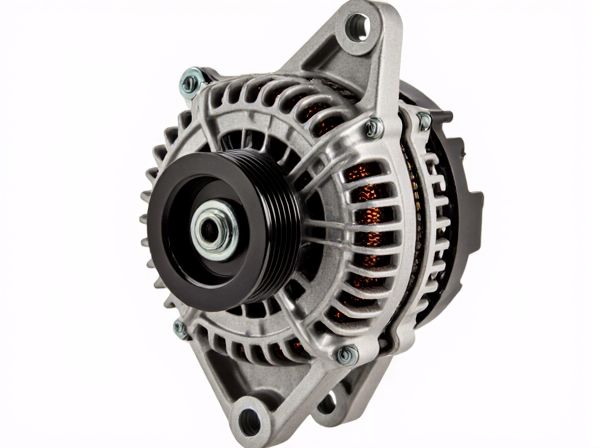
Photo illustration: Liquid-Cooled vs Air-Cooled Alternator
Liquid-cooled alternators offer superior heat dissipation, making them ideal for high-performance or continuous-use applications where maintaining optimal temperature is critical. Air-cooled alternators, while generally more cost-effective and easier to maintain, rely on airflow to manage heat, which can limit their efficiency under heavy loads. Your choice depends on balancing the need for cooling efficiency with maintenance requirements and operating conditions.
Table of Comparison
| Feature | Liquid-Cooled Alternator | Air-Cooled Alternator |
|---|---|---|
| Cooling Method | Uses liquid coolant to dissipate heat | Relies on airflow for heat dissipation |
| Heat Dissipation Efficiency | Higher heat dissipation, better for high load | Lower heat dissipation, suitable for moderate load |
| Size and Weight | Typically larger and heavier due to cooling system | Smaller and lighter with fewer components |
| Durability | Enhanced durability under extreme conditions | Less durable in high-temperature environments |
| Maintenance | Requires coolant checks and possible leaks monitoring | Lower maintenance, mainly cleaning vents |
| Cost | Higher initial and maintenance cost | More cost-effective upfront and over time |
| Typical Applications | Heavy-duty vehicles, high-performance engines | Standard passenger vehicles, light-duty engines |
Introduction to Alternator Cooling Methods
Alternator cooling methods are essential for maintaining optimal performance and preventing overheating in electrical power generation systems. Liquid-cooled alternators use a coolant, often water or a water-glycol mixture, circulated through the alternator to absorb and dissipate heat efficiently. In contrast, air-cooled alternators rely on airflow generated by fans or natural convection to remove heat, offering a simpler design but typically with lower cooling capacity compared to liquid cooling systems.
Understanding Liquid-Cooled Alternators
Liquid-cooled alternators utilize a coolant fluid to dissipate heat more efficiently, enabling higher power output and extended operational life compared to air-cooled models. The coolant circulates through channels in the alternator housing, maintaining optimal temperatures even under heavy loads or in confined environments. This advanced cooling method reduces thermal stress and enhances reliability in demanding industrial and automotive applications.
Key Features of Air-Cooled Alternators
Air-cooled alternators utilize ambient air to dissipate heat, featuring fans directly attached to the rotor for continuous airflow, which ensures effective temperature regulation without additional cooling systems. These alternators are typically lighter, simpler in design, and easier to maintain compared to liquid-cooled counterparts, making them ideal for applications where robustness and cost-efficiency are prioritized. Air-cooled alternators generally operate within a temperature range suitable for various industrial and commercial uses, providing reliable performance under moderate load conditions.
Performance Comparison: Liquid vs Air Cooling
Liquid-cooled alternators offer superior thermal management, maintaining lower operating temperatures under high loads compared to air-cooled models, which reduces the risk of overheating and extends component lifespan. The efficient heat dissipation in liquid-cooled systems enhances continuous power output and reliability, particularly in demanding industrial environments. Air-cooled alternators, while simpler and less costly, may experience performance degradation in prolonged high-temperature conditions due to limited heat dissipation capacity.
Efficiency and Power Output Differences
Liquid-cooled alternators maintain higher efficiency by operating at lower temperatures, which reduces electrical resistance and minimizes energy loss. Air-cooled alternators typically experience higher operating temperatures, leading to decreased power output and increased wear over time. The superior thermal management in liquid-cooled systems results in improved power density and consistent performance under heavy loads.
Maintenance Requirements and Lifespan
Liquid-cooled alternators require regular inspection of coolant levels, hose integrity, and radiator condition to prevent overheating and maintain optimal performance, while air-cooled alternators demand routine cleaning of air passages and fan blades to avoid dust buildup and thermal stress. The advanced cooling efficiency of liquid-cooled models generally extends their operational lifespan by reducing thermal degradation compared to air-cooled units, which may experience shorter service life due to higher operating temperatures. Proper adherence to maintenance schedules for both types significantly influences durability and reliability in industrial and automotive applications.
Cost Analysis: Installation and Operation
Liquid-cooled alternators typically incur higher installation costs due to the complexity of the cooling system, including pumps, radiators, and coolant plumbing, whereas air-cooled alternators have simpler, less expensive installation requirements. Operational expenses for liquid-cooled systems often rise from the need for regular coolant maintenance and potential leak repairs, while air-cooled alternators benefit from lower maintenance costs but may face efficiency losses in high-temperature environments. Evaluating long-term cost-effectiveness involves balancing the initial investment and ongoing operational expenses against the alternator's expected performance and environmental conditions.
Noise Levels and Environmental Impact
Liquid-cooled alternators operate with significantly lower noise levels due to the efficient heat dissipation through coolant circulation, reducing mechanical and thermal stresses that cause operational noise. Air-cooled alternators generate higher noise as air flow and fan operation create additional sound, impacting noise pollution in nearby environments. Environmentally, liquid-cooled systems require coolant management to prevent leaks and contamination, while air-cooled designs eliminate coolant use but may contribute to higher emissions from increased energy consumption caused by less efficient cooling.
Ideal Applications for Each Cooling System
Liquid-cooled alternators are ideal for high-performance industrial applications and heavy-duty vehicles where continuous power output and efficient heat dissipation are critical. Air-cooled alternators suit smaller or portable generators and light machinery, offering simplicity and reduced maintenance in lower heat environments. Selection depends on operational load, ambient temperatures, and maintenance capabilities.
Choosing the Best Alternator for Your Needs
Liquid-cooled alternators offer superior thermal management, ensuring higher efficiency and longer lifespan in demanding industrial applications, while air-cooled alternators provide simplicity and cost-effectiveness for less intensive uses. When choosing the best alternator for your needs, consider factors such as operating environment, power output requirements, and maintenance capabilities. Liquid-cooled models perform best in high-load, continuous operation scenarios, whereas air-cooled options are ideal for moderate use with easier servicing and lower upfront costs.
 caratoz.com
caratoz.com